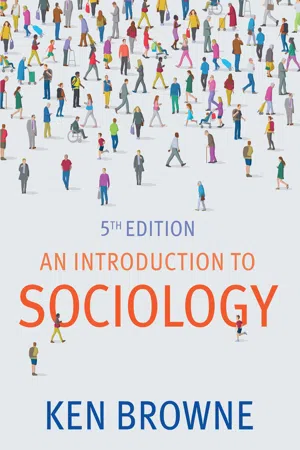
An Introduction to Sociology
Ken Browne
- English
- ePUB (mobile friendly)
- Available on iOS & Android
An Introduction to Sociology
Ken Browne
About This Book
This fifth edition of An Introduction to Sociology provides an accessible and engaging introduction to sociology, without oversimplifying or passing over the important and exciting insights sociology has to offer. Building on the book's existing achievements, Ken Browne has restructured the fifth edition to focus on the core issues in sociology considered in introductory courses. The book covers all the topics and options specified by the GCSE and IGCSE examining boards, including the required classic texts and theoretical perspectives which are helpfully applied throughout the chapters. The new edition has been completely updated to reflect contemporary social changes, including the latest statistics and topical illustrative examples. New material is to be found throughout, such as more extensive treatment of family and household diversity, the marketization of education, social inequality, the control and prevention of crime, and the effects of new media technologies. Carefully designed to support and extend students' learning, a number of features – such as a range of activities, questions and discussion points – add to the book's value as a learning and teaching resource. Explanatory graphics, photographs and cartoons also enliven the text, presenting sociology as an exciting and relevant topic to students of all ages, interests and abilities. The new edition of this highly successful textbook will prove invaluable to anyone first approaching sociology, especially on Access, GCSE and related courses. Students will find the book provides an easy-to-follow and thoughtful introduction to studying sociology.
Frequently asked questions
Information
CHAPTER 1
The Sociological Approach: Key Ideas and Concepts
Contents
- Key Issues
- What is sociology?
- How did sociology develop?
- Sociology and common sense
- Sociology and biological explanations: nurture v. nature
- Sociology and journalism
- Sociology and psychology
- Sociology and science
- What is meant by social structure?
- What are social processes?
- Socialization
- Social control
- An example of a social process: gender role socialization
- Social issues, social problems and social policy
- Social issues
- Social problems
- Social policy
- Sociology, social problems and social policy
- Chapter summary and revision checklist
- Key terms

KEY ISSUES
- What is sociology?
- What is meant by social structure?
- What are social processes?
- Social issues, social problems and social policy
WHAT IS SOCIOLOGY?
How did sociology develop?
Auguste Comte (1798–1857)
Table of contents
- Cover
- Front Matter
- Introduction to the Fifth Edition
- How to use this book
- 1 The Sociological Approach: Key Ideas and Concepts
- 2 Sociological Theories and Research Methods
- 3 Families
- 4 Education
- 5 Crime and Deviance
- 6 Social Stratification and Social Inequality
- 7 The Media
- 8 Health and Illness
- AQA and WJEC-Eduqas ‘classic text’ references
- Glossary
- Answers to questions in chapter 2
- Illustration credits
- Index
- End User License Agreement